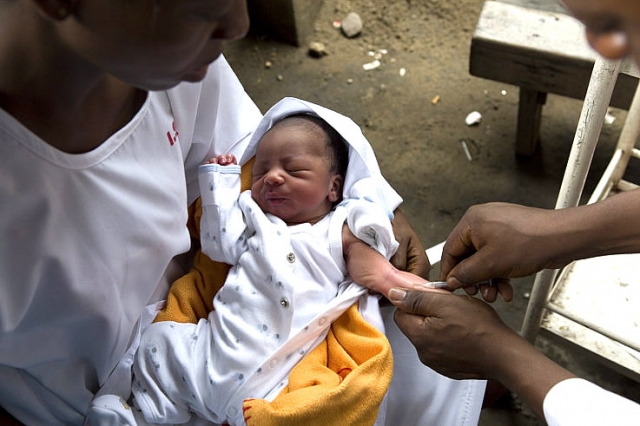WHO identifying innovative ways to strengthen immunization services in Central Africa
 Douala, 25 February 2015 –- The World Health Organization (WHO) Inter-country Support Team (IST) for Central Africa is convening its Expanded Programme on Immunization (EPI) Managers’ meeting in Douala, Cameroon from 23 to 27 February 2015 to strengthen and improve access to immunization services in 10 countries in Central Africa.
Douala, 25 February 2015 –- The World Health Organization (WHO) Inter-country Support Team (IST) for Central Africa is convening its Expanded Programme on Immunization (EPI) Managers’ meeting in Douala, Cameroon from 23 to 27 February 2015 to strengthen and improve access to immunization services in 10 countries in Central Africa.
The meeting was officially opened by the Secretary General of the Littoral region on behalf of the Governor and attended by more than 120 participants including the WHO and UNICEF Representatives in Cameroon.
Immunization is considered as one of the most cost-effective public health interventions but many people still do not have access to life-saving vaccines. Reaching the un-served 20% of children and other high-risk groups in the African Region represents one of the most daunting challenges but the EPI Managers are addressing these challenges in order to achieve universal immunization coverage in their respective countries.
Universal immunization coverage is the overarching goal in the Regional Immunization Strategic Plan 2014–2020 but other objectives of this plan include:
- To complete the interruption of poliovirus transmission and ensure virus containment;
- To eliminate measles and advocate for the elimination of rubella and congenital rubella syndrome;
- To attain and maintain elimination/control of other vaccine-preventable diseases.
In 2014, Central Africa reported five cases of polio in Cameroon and five in Equatorial Guinea. Until polio is completely eradicated, it places all countries at risk of outbreaks. The Polio Eradication Initiative (PEI) has placed urgent emphasis on improving immunization systems in order to ensure complete interruption of wild poliovirus (WPV) and vaccine-derived poliovirus (VDPV) circulation in 2015 and beyond.
Progress towards the elimination of maternal and neonatal tetanus (MTN), measles as well as rubella vaccine introduction is being discussed in the Douala meeting. In many Central African countries, maternal and neonatal tetanus (MNT) continues to be among the most common lethal consequences of unclean deliveries and umbilical cord care practices.
Measles is a highly infectious vaccine-preventable disease and remains a leading cause of childhood death. However, many countries in Central Africa have immunized only about 75% or less of their populations through routine immunization, when the recommendation is to reach 95%.
Implementation of the Reach Every District (RED) approach and other locally-tailored approaches will be promoted to maximize the accessibility and utilization of immunization services. This will ensure greater involvement of individuals and communities in moving from supply-driven to demand-driven immunization services.
Making the best use of the available vaccines requires a renewed emphasis on, and prioritization of, routine immunization services – the platform on which all immunization activities can be mounted – within the context of health system strengthening, based on national decision-making.
These strategic thrusts are to build the competences of health workers to plan, implement and monitor immunization services and strengthen the cold chain system and vaccine management practices. Implementation research will be required for enhanced understanding and better implementation of key approaches to improve and maintain high level vaccination coverage in Central Africa.
Stakeholders taking part at the meeting include but not limited to the GAVI Secretariat, Bill & Melinda Gates Foundation, Preventive Medicine Agency (AMP), ROTARY International, U.S. Centers for Disease Control and Prevention (CDC), Helen Keller International (HKI), Maternal and Child Health Integrated Program (MCHIP), the Organization for the Coordination for the Fight against Endemic Diseases in Central Africa (OCEAC), Sabin Vaccine Institute, the International Federation of the Red Crescent (IFRC), the Cameroon Red Cross, Plan Cameroon and the President of the National Committee of Cameroon polio certification.
_________________________________
For more information, please contact:
Technical contact:
Dr Richard Mihigo; Tel: +472 413 9926; Email: mihigor [at] who.int (mihigor[at]who[dot]int)
Media contact:
Dr Cory Couillard; Tel: + 472 413 9995; Email: couillardc [at] who.int (couillardc[at]who[dot]int)


